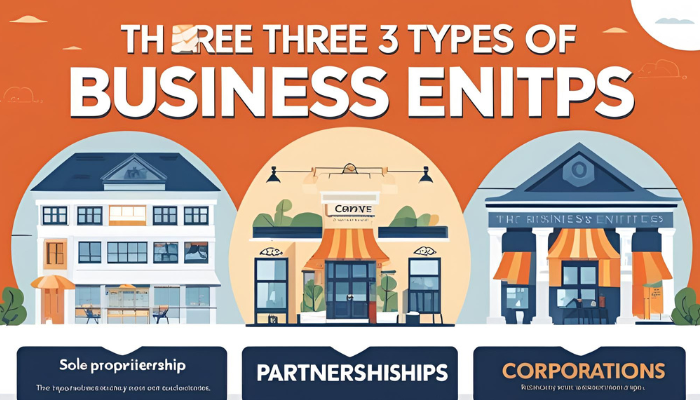
What are the 3 Types of Business Entities?
Choosing the correct company entity is very important when you establish a firm. We assist our customers understand their choices and choose the structure that offers the best protection against liability, the most tax efficiency, and the best long-term development. We will talk about the three most popular sorts of businesses in the United States below.
Sole Proprietorship
The simplest kind of business is a sole proprietorship. It is owned and run by one person. There is no need to register with the state. The owner’s personal tax return shows all of the business’s income and losses, and the owner is responsible for all of the business’s obligations.
This structure is great for low-risk businesses with just one owner, but it puts personal assets at danger of being claimed by the firm.
Read: What is VAT ID?
Partnership
Next is the partnership, which is when two or more individuals own a company together. The most common types are:
General Partnership (GP)
All partners are responsible for managing the business and paying off debts.
Limited Partnership (LP)
One GP is fully responsible. LP members put in money but are only responsible for that money.
There is also the minimal responsibility Partnership (LLP), which gives all partners minimal responsibility while keeping their management powers.
Partnerships are “pass-through” businesses, which means that each partner’s personal tax return shows their share of the earnings and losses. Professional organizations, real estate companies, and small owner teams typically employ them.
Get the best QuickBooks & bookkeeping services.
Corporation
You may create a company by submitting articles of incorporation with the state. Corporations safeguard shareholders’ personal assets quite well.
Some common categories are:
C Corporation (C-Corp)
C-Corp pays taxes at the corporate level and again on dividends distributed to shareholders. This is called “double taxation.”
S Corporation (S-Corp)
S-Corp shareholders get their part of the company’s revenue without paying corporation tax. Subject to eligibility conditions (for example, no more than 100 U.S. citizens or permanent residents)
A lot of Limited Liability Companies (LLCs) include parts of both partnerships and corporations. LLCs have limited liability and pass-through taxes. They may also choose to be taxed like a corporation if it is better for them.
Read: What is industry accounting?
Pick the Right Structure for You
Each form of entity has its own pros and cons:
Risk tolerance and liability exposure
Sole proprietorships and general partnerships have limitless personal liability.
Tax treatment
Individuals and partnerships pay personal taxes; C-Corps pay taxes twice; S-Corps and LLCs may avoid corporation tax by using pass-through status.
Potential for growth and investment
Corporations may sell stock, which makes it easier to raise money and grow.
Regulatory burden
Corporations have to do more paperwork, whereas LLCs provide a good mix of protection and operational freedom.
How L&Y Tax Advisors Can Help You?
Our staff at L&Y Tax Advisor helps company owners with:
- Looking at how much responsibility you have and how to safeguard your own assets
- Figuring out the tax effects of each arrangement
- Giving advice on what each state requires and how to file
- Getting ready for changes or growth in the future
Use our failure to pay penalty calculator.
The Bottom Line
Comprehending what are the 3 types of business entities can have a big effect on your taxes, legal risks, and overall success. If you are not sure which one meets your long-term goals, our experienced tax consulting services can help you make the best option.
Use our failure to file penalty calculator.


